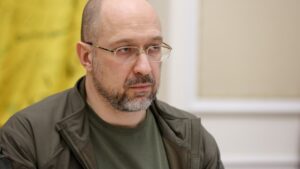
Ukraine has attracted more than $31 billion from international partners since February 24, 2022, Prime Minister Denis Shmygal said at the last regular government meeting this year on Friday.
“We’ve said many times this year that armies win battles and economies win wars. We’ve managed to keep financial, banking and economic stability. We managed to fund all key budget expenditures.
We have not delayed pensions, doctors’ or teachers’ salaries. Every week we have held and continue to hold talks to mobilize more support for Ukraine. During these 10 months we have already raised more than $31 billion from our partners, “- said Shmygal. The prime minister stressed that next year the authorities also understand how they will fund the budget and reconstruction.
“Another step in support of healthy public finances was a successful debt policy. Negotiations conducted by the government and the Ministry of Finance ended with all payments on foreign debt being postponed for 2 years. About 200 billion hryvnias were raised from the sale of war bonds. International support has become very important,” he said.
At the same time, Shmygal noted that 2/3 of all funds, which Ukraine received in the budget, is a domestic resource – the payment of taxes, duties, and the purchase of bonds.

By the end of this year, raw milk production in Ukraine will total roughly 7.5 mln t, which is 13.9% less than last year, of which 4.9 mln t will be produced by households (-15% by 2021), and 2.6 mln t (-5%) – by specialized enterprises.
Total supply of milk and dairy products in 2022 will be 7.9 million tons, said deputy director of livestock and breeding department of the Ministry of Agrarian Policy and Food of Ukraine Elena Dadus in her column on the website of the industry analytical agency “Infagro”.
According to her predictions, this year the export of milk and dairy products from Ukraine will amount to 510 thousand tons, and import – 415 thousand tons.
In addition, according to State Statistics Committee of Ukraine, consumer price index of milk in January-November 2022 increased by 18.4% as compared to the same period of 2021.
It is specified that the vast majority of milk is produced in regions where there are no military operations – 94.7%. At the same time, during the year its production increased in some regions – Rivne, Ternopil, Khmelnytskyi and Cherkasy. This shows that there is a demand for dairy products, and that the vacuum created by the destruction of enterprises in the South and East of Ukraine is being filled by enterprises from safer parts of the country.
“This year, 2022, has been a challenge and a test for the dairy industry. The important thing is that finally everyone has found and filled their niche, competing and along with it not destroying the opponent. When supply chains were destroyed, both raw materials and products, small local trading networks came to the rescue, and small and medium enterprises for primary processing of products began to appear rapidly, and, thus, the supply of products to local local markets was provided”, – specified the representative of the Ministry of Agrarian Policy in her column.
Subsequently, when export routes were established and new European markets opened for Ukraine, there was a reorientation of individual enterprises to European markets, and due to the favorable global environment there was an opportunity to export Ukrainian products at a more attractive price.
“The main task is to keep the balance between the margins of business and meeting the needs of the population, because the market capacity is often conditioned by the purchasing power of consumers of products,” Dadus stated the results of the year for the industry.
As reported with reference to the data of the Association of Milk Producers (AMP), milk production in Ukraine for 10 months of 2022 decreased by 12.4% – to 6.56 million tons at the background of the reduction of livestock and productivity of cows in the frontline zones and areas with active fighting.
At the same time, the supply of basic fat milk for processing in Ukraine decreased by 13.5% to 1.99 million tonnes. In addition, the role of the industrial sector in food processing continues to strengthen: 1.7 million tons, or 85.7% of raw milk received for processing from dairy farms, while the share of “homemade” milk fell to 14.6%.
Proceeds from exports of dairy products from Ukraine in September reached a record high since the beginning of the year – $35.9 million, which is 9.2% more than in August 2022, and 2.45 times more than in September 2021.

More than 35 thousand apartments were commissioned in Ukraine in 2022, most of them – in Kiev and the region, according to the real estate portal LUN.
According to its data, about 13.2 thousand apartments were commissioned in Kiev, 7.2 thousand – in the Kiev region. Lviv is also among the leaders – 3.8 thousand, Odessa – 2.3 thousand, Ivano-Frankivsk – 1.6 thousand apartments.
Most queues of new buildings which received a certificate of commissioning were recorded in the Kiev region (66), Kiev (40) and Lviv (32). Over ten queues are also commissioned in Ivano-Frankivsk (17), Odessa (12), Ternopil, Lutsk and Khmelnytsky (10).
At the same time, the number of objects at the start of construction in 2022 was halved: as for the third quarter, construction began on 68 thousand new apartments, according to the portal.
According to LUN, interest in buying a home has decreased by half compared to the prewar beginning of the year. Thus, in Kiev the figure is 45% of February, in Lviv – 54%, Odessa – 43%, Uzhgorod – 68%, Dnipro – 57%.
At the same time the cost of housing has increased despite the decline in demand. According to the portal, the cost per square meter in the most popular class of housing – “comfort” – in the capital increased by 37% to 37 thousand UAH, in Lviv – by 60%, to 38.3 ths. In Lviv – 60% increased up to 38.3 thousand UAH, in Uzhgorod – 57% up to 34.2 thousand UAH, in Ivano-Frankivsk – 63% up to 222 thousand UAH, in Odessa – 56% up to 35.9 thousand UAH, in Dnipro – 44% up to 33.1 thousand UAH, in Poltava – 37% up to 30 thousand UAH.
By the end of the year the cost of the cheapest one-bedroom apartment in Kiev increased by 66% since the beginning of the year and is 2.3 million UAH, 2-bedroom – “plus” 70%, 3.2 million UAH, the price of 3-bedroom increased by 76% to 4.4 million UAH.
LUN estimated that the number of new buildings available for sale in Kiev is 83% (182 new buildings by the end of the year) from the prewar beginning of the year, in Lviv – 103% (121 new buildings), in Odessa – 72% (79 objects), in Dnipro – 63% (42), Ivano-Frankovsk – 98% (70), in Khmelnytsky – 77% (56), in Ternopil – 132% (69).
“Due to the war and losses in the economy, housing has become less affordable, and the need for it – much more acute. It can already be argued that more than 1 million families in Ukraine need new housing. It is impossible to satisfy this demand with the apartments that have already been built, because so many apartments are not on sale, and that is why Ukraine is waiting for the Big Housing Construction phase. The state understands this and has plans to expand the scale of preferential mortgages, but this will still not be enough to cover the needs of IDPs, so we expect further steps from the authorities”, – summarized Denis Sudilkovsky, marketing director of LUN.

Bitcoin price collapsed by more than 60% in 2022: at the end of December, the cryptocurrency was around $16,500,000 compared to its historic high of almost $70,000 in November 2021.
Bitcoin in 2021 was supported by the inflow of capital to the markets and extremely low or zero interest rates, with Goldman Sachs experts at the time even comparing bitcoin to gold, writes Trading Economics.
Meanwhile, a jump in inflation in 2022 and tighter financial conditions triggered a collapse in the cryptocurrency market.
The sell-off intensified first as TerraUSD steiblocoin collapsed and then after the bankruptcy of cryptocurrency exchange FTX, the world’s second-largest.
Bitcoin is down 0.8 percent Friday at $16,471,000, according to CoinDesk.
Import of goods to Ukraine in % to previous period in 2021 and 2022

SSC of Ukraine

579 filling stations of the U.GO and Ukrnafta brands, which are part of Naftogaz group, have the appropriate equipment and are ready to operate in case of a blackout, the company said in a press release on Friday.
“Gas stations are represented in 20 regions of Ukraine and Kiev,” the group said.
A full list of gas stations can be found on Naftogaz Group’s Power Drive website: fill up at U.GO and Ukrnafta gas stations even in blackout conditions | Naftogaz Ukrainy (naftogaz.com).
“The enterprises of the Naftogaz group do everything possible to support Ukraine and the Ukrainians during the war. So we will be glad to see you at U.GO and Ukrnafta gas stations equipped with generators, which are ready for any possible challenges,” Oleksiy Chernyshev, chairman of the board of Naftogaz Ukraine, was quoted in the press release.
As reported, Naftogaz Oil Trading (a subsidiary of the NJSC) as of November 2022 launched 46 gas stations under the brand U.GO on the basis of assets of the arrested network Glusco, which consists of 126 gas stations
“Ukrnafta owns 85 special permits for the production of hydrocarbons. On its balance sheet there are 1,809 oil and 153 gas wells. The company owns 537 petrol stations, of which 449 were in operation at the beginning of December 2022. The controlling stake in the company belongs to Naftogaz of Ukraine, while the minority stake (about 42%) was held by Igor Kolomoysky and Hennadiy Boholyubov’s structures before the withdrawal.